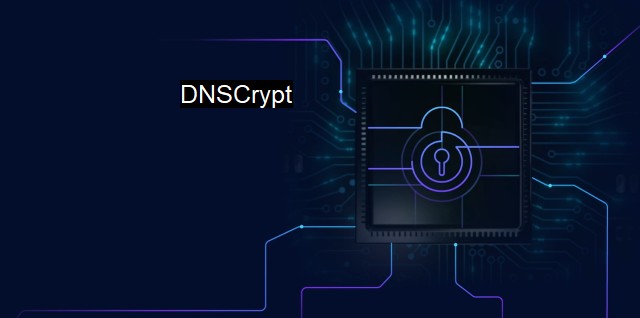What is DNSCrypt?
Securing Online Privacy: How DNSCrypt Uses Encryption Technology to Protect Against Hackers and Malware
DNSCrypt is a protocol that adds an extra layer of security to online communications, substantiating its position as a significant proponent of cybersecurity. DNSCrypt leverages the implementation of cryptographic methods to provide improved internet safety. While the context of cybersecurity largely involves an expansive variety of strategies, protective measures, tools, including antivirus softwares, protocols such as DNSCrypt serve to secure certain components of online interactions.Domain Name System (DNS) is typically the basis of internet usage, translating domain names that people understand into Internet Protocol (IP) addresses that computers and servers understand. But legacy DNS was not originally designed with privacy or security in mind, so data communication through DNS is typically in clear text, thereby leading to privacy issues and becoming an easy target for cybercriminals. This is precisely where DNSCrypt comes into action, adding an additional layer of security to the DNS.
DNSCrypt converts plain text DNS communications into encrypted requests, ensuring that these requests cannot be read, much less tampered or manipulated, by any middleman. Effective DNSCrypt prevents DNS attacks, including DNS cache poisoning and Distributed Denial of Service (DDoS) attacks. The prime focus of DNSCrypt is to ensure DNS client and DNS resolver can communicate securely, making it nearly impossible for third parties to manipulate the communication.
The primary role of DNSCrypt is not only confined to encrypting the communication but also ensuring authentication. It validates the responses from DNS resolver to DNS client, endorsing that the responses are from the legitimate DNS resolver. DNSCrypt dodges threats including man-in-the-middle attacks, where an attacker intercepts and possibly alters the communication between two parties without their knowledge. An attacker with this type of access could redirect traffic, censor information, or eavesdrop on users, threatened privacy, and compromising security.
While DNSCrypt is specifically designed to protect DNS communication, antivirus systems' role within the realm of cybersecurity dwells on the safeguarding of computers from a myriad of different threats. Antivirus software helps in preventing, detecting, and removing malicious software, including viruses, worms, trojans, and ransomware, amongst others.~
Even though DNSCrypt is a protocol and antivirus is software, they work towards a common goal: protecting users from cyber threats. DNSCrypt secures online communications at the DNS level, thereby making it harder for cybercriminals to manipulate the traffic while antivirus software serves as the last line of defense on personal computers. In synergy, these two work in harmony to provide robust cybersecurity, creating a multilayered defensive structure against a variety of threats.
The implementation of DNSCrypt is not devoid of challenges. One of the prime concerns is that it demands considerable computing resources. The implementation of on-the-fly encryption and decryption of DNS requests can test the limits of strained devices.
Meanwhile, there is also a critical trade-off to consider: while DNSCrypt improves privacy by encrypting the communication, it increases opacity in network monitoring as the operators cannot see the content of the traffic. This could potentially hinder the troubleshooting process, making it tough to pinpoint cyberattacks at earlier stages.
Despite these challenges, DNSCrypt remains an indispensable protocol focusing on the firmament of cybersecurity. As cyber threats continue to evolve, the need for encryption-based security, such as DNSCrypt, is increasingly becoming more necessary. Contributing in tandem with antivirus systems, DNSCrypt serves to ensure safer and protected online interactions. Emphasizing privacy and security, DNSCrypt encourages a more robust and comprehensive cybersecurity framework, playing an essential role in internet safety.

DNSCrypt FAQs
What is DNSCrypt?
DNSCrypt is a protocol that encrypts Domain Name System (DNS) traffic between a device and a DNS resolver. It is used to protect against eavesdropping and man-in-the-middle attacks on the DNS traffic.What are the benefits of using DNSCrypt?
The main benefit of using DNSCrypt is that it adds an additional layer of security to DNS traffic, making it more difficult for malicious actors to intercept and modify the traffic. It also helps to protect user privacy by making it more difficult for third parties to track and monitor online activities.How does DNSCrypt work?
DNSCrypt works by encrypting DNS requests and responses between a device and a DNS resolver. This is done using public-key cryptography, where the device generates a unique public key that is used to encrypt the DNS traffic. When the traffic reaches the DNS resolver, it uses its private key to decrypt the traffic and process the DNS request. The response is then encrypted using the device's public key and sent back to the device.Can DNSCrypt be used with antivirus software?
Yes, DNSCrypt can be used alongside antivirus software to provide an additional layer of protection against cyber threats. It is important to note that DNSCrypt is not a replacement for antivirus software, but rather a complementary technology that can help to strengthen overall cybersecurity defenses.| | A | | | B | | | C | | | D | | | E | | | F | | | G | | | H | | | I | | | J | | | K | | | L | | | M | |
| | N | | | O | | | P | | | Q | | | R | | | S | | | T | | | U | | | V | | | W | | | X | | | Y | | | Z | |
| | 1 | | | 2 | | | 3 | | | 4 | | | 7 | | | 8 | | |||||||